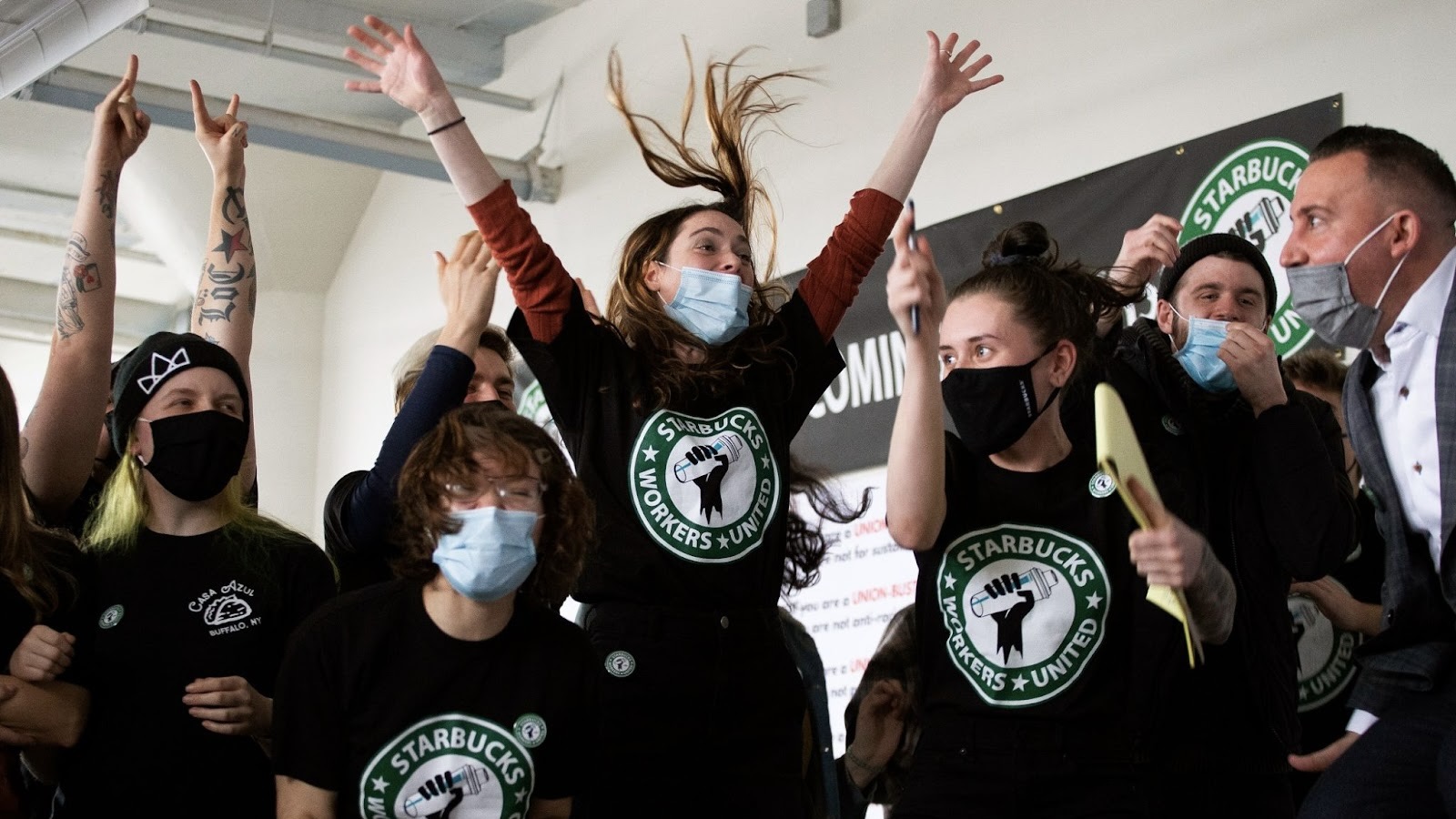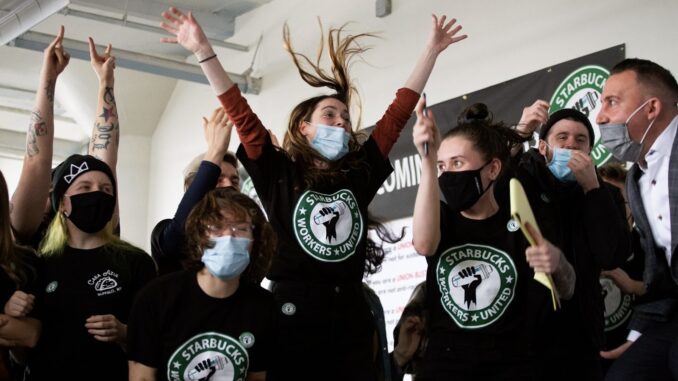

Buffalo, N.Y.
The spark that started in this city last August, when Starbucks workers announced their intent to unionize, has turned into a wildfire of righteous working-class ambition, with new locations across the country filing for union elections.


Stores in Mesa, Arizona; Boston; Seattle; Knoxville, Tennessee; Chicago; and Bloomfield, Colorado, have joined the fight, widening the scope of the struggle across the country. Victories in two of the first three stores that voted in Buffalo (the second is still being contested in court) demonstrated that organizing a union — even against a company with as much money and contempt for its workers as Starbucks — is a fight that can be won.
This tidal wave of new union petitions being filed comes at a time when COVID-19, especially cases caused by the omicron variant, is tearing through the United States with record-breaking infection rates. Starbucks locations in Buffalo, and no doubt other cities, are facing a spike in infections. Starbucks has flooded the district with new hires in an attempt to dilute a union vote that took place Dec. 9 for three stores in Buffalo. Now these new hires are facing the recent wave of infections head-on, with no health insurance or paid sick leave time.
Many of Starbucks’ benefits do not kick in on day one, leaving many workers without the resources and medical care they need. In addition, workers confirmed to have been exposed to COVID-19 for extended periods of time, while vaccinated and asymptomatic, are not being offered paid isolation time to get tested. This leaves many workers feeling unsafe on the job, having already seen baristas who are fully vaccinated test positive for COVID-19.
Starbucks management asserts that its policy is in line with Centers for Disease Control guidelines. However, in a country with over three-quarters of a million people already killed by the disease, it should be obvious that the CDC guidelines have been decidedly insufficient up to this point.
This public health catastrophe, combined with the deteriorating capitalist economy and rising cost of living, has left workers with little choice other than to organize for their own collective interests. What is a nightmare scenario for workers is the perfect storm to ignite a militant revival of the labor movement, with youth at the forefront of the fight. Despite these desperate circumstances for many, Starbucks workers are unionizing and not simply as a result of the failure of the company to address any particular problem.
Class-conscious workers push for real change
In letters sent to Starbucks CEO Kevin Johnson informing him of new stores joining the fight, Starbucks workers made it clear that the unionization efforts are not in response to any specific policies at Starbucks but are actually part of a larger vision to make their worksites and communities a better place. This shows that workers are beginning to see unions not just as a tool to react against bad treatment but as a proactive tool they can wield to take a more active role in shaping their community.
From a socialist perspective, this development in the consciousness of the working class cannot be overstated. We are seeing workers become more collectively aware of our world-historic role as agents of change in society, the only force that can bring about a revolutionary break from capitalist exploitation.
Workers across the board are no longer content with acting as passive observers to their own exploitation. If this kind of awareness can continue to reach outside of these pockets of struggle and into other workplaces, apartment buildings and the broader community, a classwide perspective will be reached that can arm working-class and oppressed people with the ideological tools needed to achieve liberation beyond mere pay raises and contractual benefits.
In order for this class consciousness to be achieved, it is imperative that working-class organizers within the United States understand their class position not simply in terms of their own locality or country, but as part of an international working class. Companies like Starbucks, Amazon, Walmart and others are global imperialist behemoths that exploit workers at home and abroad, whether baristas, farmers or delivery drivers. But even if we take a more narrow perspective and zoom in on one particular workplace in the United States, we see that the conditions of the workers are tied intrinsically to the conditions of workers in other countries.
Need for global class unity
As Marxist thinker and the late chairperson and founder of Workers World Party Sam Marcy explained in his book, “High Tech, Low Pay: A Marxist Analysis of the Changing Character of the Working Class,” because of the global nature of the capitalist economy, workers within the United States are directly competing for jobs with workers of other countries. An unprecedented advance in technology has made it easier than ever to send jobs overseas, to countries where huge corporations pay only a fraction of what it costs in the United States to pay union workers with full benefits to do the same job.
This direct competition with low-wage jobs around the world in turn drives down wages for workers in the United States, limiting how much can be won strictly through bargaining with union contracts. In other words, a labor movement in the U.S. that does not take on an internationalist perspective to match the international nature of the working class will, in the long run, shoot itself in the foot. Just as workers are always more powerful in the workplace when they unite together against their boss, the working class of one country is more powerful when it unites with other workers across national boundaries against their shared capitalist exploiters.
Developments within the labor movement in the U.S. open up new possibilities for workers on a global scale. After decades of the labor movement being gutted, workers are making a comeback. The victory in Buffalo is the first of many to come, for baristas as well as the whole working class.
The author is a contributor to Workers World newspaper and a union committee organizer with Starbucks Workers United in Buffalo.
Download the PDF May Day appeal to the working class Revolutionary change is urgent! Gaza…
Philadelphia On March 26, the Pennsylvania Supreme Court denied political prisoner Mumia Abu-Jamal permission to…
There are two important and overlapping holidays on April 22: Earth Day and Vladimir Lenin’s…
Twelve people were arrested April 9 for blocking traffic to Travis Air Force Base, a…
Secretary-General of Hezbollah Sheikh Naim Qassem delivered a speech on April 18, 2025. Resistance News…
Anakbayan Philadelphia held a rally on April 19 to demand the U.S. end its military…